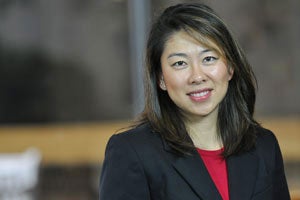As a little girl in Berkeley, Calif., U.S. Navy Lieutenant Commander Sylvaine Wong LL.M. ’11 became enamored of the Navy when her dad took her each year to “Fleet Week” to clamber aboard aircraft carriers and visit other military craft.
“I grew up always wanting to be in the Navy. It affected my entire thought process,” says Wong, who was drawn especially to the idea of service to her country. After graduating U.C. Berkeley in 1998, she enrolled at Columbia Law with the intention of becoming a JAG officer. But, before the terrorist attacks of Sept. 11, 2001, she found no classmates who shared her military interest, and in fact most seemed puzzled that she would turn down an associate position with a big New York law firm.
Wong finds the atmosphere at HLS today very different, with three other active duty military in the LL.M. program this year, as well as a number of J.D. students who are military veterans, several who have recently commissioned as officers with the JAG Corps, and others who are applying for a commission.
Wong’s first tour of duty was for three years at Yokosuka Navy Base in Japan, where she handled civil legal matters for sailors such as wills and domestic cases, then defended sailors charged with drug abuse, assault and other crimes before her stint aboard the Essex. She has also served as staff judge advocate—in essence, general counsel for the commander—at the Naval Station in Norfolk, Va., the largest naval station in the world, before moving to Washington, D.C., where she served in JAG headquarters and then as the flag aide for the deputy judge advocate general for the U.S. Navy.
“I think it’s the intrinsic value itself that carries most JAGs through the day,” she says. “Even if an 18-year-old kid joined the military because he wanted money for college or just wanted to get out of a bad situation at home, in the end, he still signed the bottom line, ‘I am willing to die for my country.’ I’m going to do whatever I can for that kid, whether it’s writing a will or drafting a new policy that tries to protect his life.”
Wong had already decided to apply to LL.M. programs before her next tour of duty, in Kandahar, Afghanistan, where she spent most of her time with the NATO Command for the international security forces working on matters related to kinetic military operations and civilian casualties. Her experience there sealed her interest in international law. At Harvard, she is taking International Human Rights Law with HLS Professor Philip Alston as well as Humanitarian Action in Armed Conflict at the Kennedy School, among other courses.
“Everything we’re discussing now here at Harvard is so relevant because I can think back to my time in Afghanistan and think, yes, this is exactly how that issue played out on the ground, for good or for bad,” says Wong.
